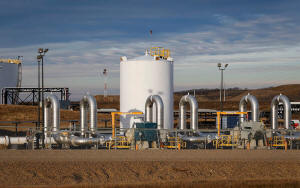Canada's prime minister discussed reviving contentious Keystone XL
pipeline with Trump
[October 09, 2025] By
ROB GILLIES
TORONTO (AP) — Canadian Prime Minister Mark Carney raised the prospect
of reviving the contentious Keystone XL pipeline project with U.S.
President Donald Trump during his White House visit this week, a
government official familiar with the matter said Wednesday.
A Canadian company pulled the plug on it four years ago after the
Canadian government failed to persuade then-President Joe Biden to
reverse his cancellation of its permit on the day he took office. It was
to transport crude from the oil sand fields of western Canada to Steele
City, Nebraska.
Trump previously revived the long-delayed project during his first term
after it had stalled under the Obama administration. It would have moved
up to 830,000 barrels (35 million gallons) of crude daily, connecting in
Nebraska to other pipelines that feed oil refineries on the U.S. Gulf
Coast.
The Canadian government official said Trump was receptive to the idea
when it was talked about during their White House meeting Wednesday. The
official said Carney linked energy cooperation to Canada’s steel and
aluminum sectors, which is subject to 50% U.S. tariffs. The official
spoke on condition of anonymity as they were not authorized to speak
publicly on the matter.
Carney mentioned building major projects and “unleashing Canadian
energy" in a live video call with business leaders in Toronto on
Wednesday.
Biden canceled Keystone XL's border crossing permit in 2021 over
longstanding concerns that burning oil sands crude could make climate
change worse and harder to reverse.

A spokesperson for South Bow Corp., the oil pipeline operator that owns
the existing Keystone pipeline system, said they are not privy to the
ongoing discussions between the Canadian and U.S. governments.
“South Bow is supportive of efforts to find solutions that increase the
transportation of Canadian crude oil. We will continue to explore
opportunities that leverage our existing corridor with our customers and
others in the industry,” the spokesperson said in an email.
[to top of second column] |

A Keystone pipeline facility stands in Hardisty, Alberta, Nov. 6,
2015. (Jeff McIntosh/The Canadian Press via AP, File)
 Carney is under pressure from the
oil-rich province of Alberta to get a pipeline built.
Former Alberta Premier Jason Kenney said building a new pipeline to
increase oil shipments to the U.S. Gulf Coast would be the cheapest,
fastest and least complicated route for a major oil pipeline.
“Strategically this would increase, not decrease our dependance on
the US export market. But it would be a brilliant judo move to find
common ground with the Trump Administration, and help him to realize
that the US benefits from and needs its privileged relationship to
Canada, and access to our resources,” Kenney posted on social media.
“Played smartly, Canada’s cooperation could be strong leverage to
push for reductions in Trump tariffs,” he added.
Carney mentioned Wednesday in the call that tariffs on Canada's
aluminum exports are not wise, noting the country provides 60% of
the aluminum the U.S. needs.
“For the U.S. to produce that much aluminum, it would need the
equivalent of the energy of 10 Hoover Dams,” Carney said. “Is making
aluminum really the first best use of that power at a time when
you’ve got the AI revolution, and you’re reassuring manufacturing
that you want to keep people’s electricity costs down at home.”
Carney also reiterated that Canada’s relationship with the U.S.,
which led to increasing integration over many years, has changed.
“Our relationship will never again be what it was," Carney said. “We
understand America first.”
All contents © copyright 2025 Associated Press. All rights reserved |